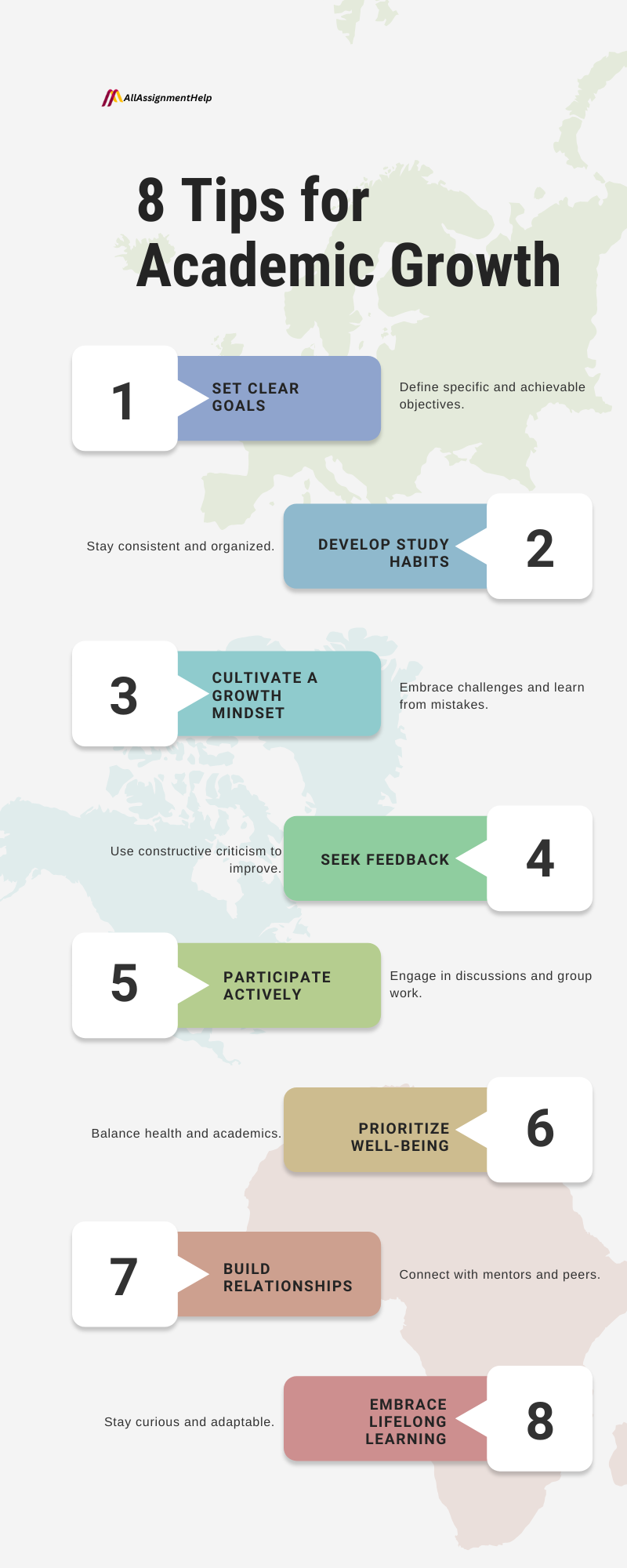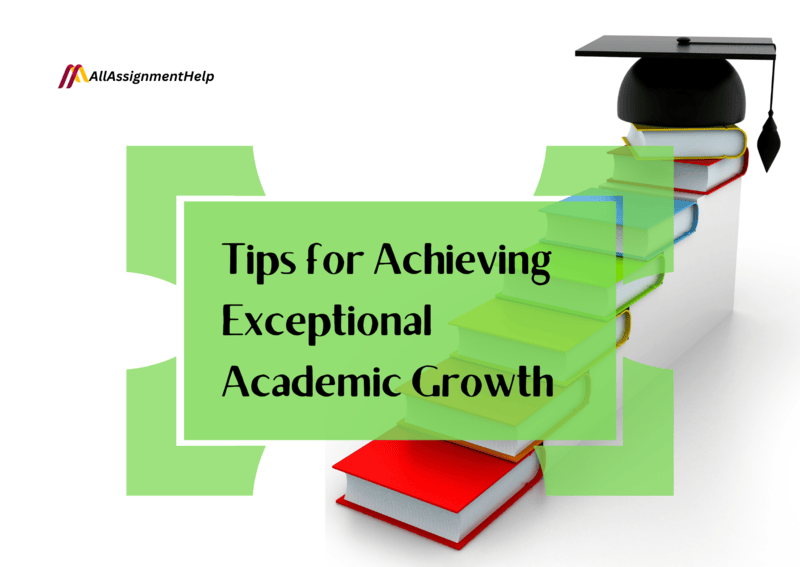Table of Contents
Gone are the days when excelling in exams was the key to success. Today, we need a growth mindset that helps you not just ace your academics but develop healthy habits that push you towards improvement today and on an everyday basis. Be it a student in high school, at undergraduate or graduate level, academic growth is inherently process-driven. You set the goals for yourself and acquire powerful study habits to keep improving. There is no overnight success in remarkable academic improvement, it is hard work. It takes energy, and it means accepting failure as one would success. In this blog by All Assignment Help, we will highlight some steps to guide you in excelling and making progress in your academic journey.
Set Clear, Achievable Goals
The foundation of academic growth is concentrating on establishing ambitious but realistic goals. No one knows where these roads lead or whether they will be occupied up ahead, so start early. Set your goals now. They are the path you must take to continue moving forward despite obstacles.
Why goal setting matters
Having academic goals helps define what you wish to accomplish, be it raising your grades, mastering a subject, or learning new skills. With your goals, you are not just working without any purpose. Having this sense of purpose can drive you to get through more challenges and distractions.
How to set effective goals
Avoid making your goals nothing but wishlists by applying the SMART framework.
- Specific: Describe exactly what you want. Rather than stating, “I want to do well in school,” state “I want my grade in chemistry up from a B to an A.”
- Measurable: You can track your progress. Now, ask yourself this: “How will I know when I am done? For example, score a specific grade or finish so many practice problems.
- Achievable: Make the goal reasonably likely, based on your existing ability, time, and resources. Though you want to push yourself, if the goal is out of reach, then all you will gain is frustration and burnout.
- Relevant: Your purpose should be in line with your long-term educational goals. For example, if you want to be a software engineer, then your goal of learning programming languages will help you achieve it.
- Time-bound: Set a deadline. Having a timeframe creates urgency and you let go of everything that is not a priority. For example, “I will finish all assigned readings before the month is over” or “I will study for the final each weekend leading up to the exam.”
This way, you have weekly progress that leads to your long-term aspirations and allows you to maintain your focus and motivation on this path. It is a tool that is simple yet effective and can serve to accelerate.
Also read: Why Exams Are the Crucial Part of Academics
Develop Strong Study Habits
Some strong study habits will assist you in achieving exceptional academic growth.
- Consistency is the key: Create a timetable to maintain flow and consistency.
- Prioritize tasks: Go for the highest value, do the difficult task first.
- Active learning: When writing notes, try summarizing, asking questions, and even teaching it to someone else.
- Reduce your distractions: Find a silent, clean study area, and attempt to reduce your cellphone and social media usage.
- Take breaks: Balance study time with short breaks, using techniques like the Pomodoro method.
- Stay organized: Have an organized system to file your notes/assignments/studying materials so you have access to them whenever you need.
- Review regularly: Revision of the previous content reinforces the content in the brain and helps in the retention of information.
- Diversify your study materials: Utilize more than just your textbook. Try to find some supplemental online material as well or more hands-on resources such as an in-person or online study group.
Also read: Balancing Academics and Social Life: The International Student Dilemma
Cultivate a Growth Mindset
Having a growth mindset is the ultimate key to academic growth as a mind hungry to learn has nothing as an obstacle.
- Embrace challenges: Take on arduous tasks as opportunities to broaden and advance, not as headaches.
- Learn from mistakes: Look at your failures as objectives with a feedback loop, it is part of the process.
- Focus on effort, not just results: Understand how important is hard work and patience in becoming successful.
- Stay positive: Change bad self-talk into smart self-talk, the first step towards self-improvement.
- Celebrate progress: As you make incremental changes, reward yourself to stay motivated and notice how far you have come.
- Be receptive to feedback: Solicit constructive feedback and use it to enhance your performance.
- Keep evolving: Accept that you can grow your intelligence and skills eventually through practice and effort.

Seek Feedback and Improve Continuously
Getting feedback is essential to the ongoing development of a student in academia. What it does is give you insights into what you are doing well on and what you need to improve on. However, constructive criticism gives you a chance to see blind spots that you may not have identified by yourself. It can lead you to more effective learning pathways. This will help ensure you stay on track and get you to make changes to your study habits if necessary.
When you are given feedback, you need to do something with it not just acknowledge it. It will make you grow. Every time you apply their feedback, you will become better and better at what you do. This means improving something, be it your study practices, working on what you find hard, or working on what you are good at; this is a part of the study. Moreover, seeking guidance from reliable online coursework writing services can improve your grades which eventually lead to your academic growth.
Engage in Active Participation
Engaging is one of the most effective means to further advance your academic interests. Discussing, asking questions, and sharing ideas in class can prioritize your learning and make it more interactive. Involvement cements ideas and cultivates critical thought. Besides participating in a classroom setting a better option is to gather in or participate in a study group where you can study with other students, meet new people with the same goal in mind and share perspectives.
Making some effort to get some exposure to real-world experience through internships, projects, and practical applications prepares you to have a great command of theoretical concepts. Get involved with extracurricular activities applicable to your field. It will not only give you more skills, and experiences but may also help your network grow. The more active you are, the more you are open to having academic growth and learning happen on multiple levels. Additionally, for a stress-free involvement, you can delegate your complex academic responsibilities like assignment writing to professionals of some good online assignment help services.
Take Care of Your Well-Being
Finding the right balance between working on school and taking care of oneself will only contribute to a sum of sustained academic growth. Incorporating the right diet and exercise routine helps to keep you in the best possible physical and mental health. It allows you to focus, retain and recall information much better and do everything at its maximum potential.
Physical health
Optimal brain function and energy levels are built on a foundation of enough sleep, exercise, and nutrition. Bad health can cause fatigue, stress, bad performance at classes, lack of concentration, etc.
Mental health
Learning is often hindered by stress, anxiety, and burnout. Set aside time for rest, leisure activities, and socializing, when possible, to maintain mental freshness. Activities such as meditation or mindfulness will control stress and distraction.
Stress management
We need to be able to identify stress triggers early so that we know how to avoid stress effectively. Taking regular breaks, having a support system of positive friends, and practising mindfulness and deep breathing exercises can help you avoid burnout and stay positive through your studies. Moreover, if academic burden is the cause of your stress, try seeking some help with coursework for your academic stress management. Give yourself time to rejuvenate.
Build Strong Relationships with Mentors and Peers
Having mentors and peer relationships is very important to academic growth. They guide you, share insights, and support you to tackle academic challenges. They will also help you to find your strengths, along with your values, and push you towards growing as much as you can.
Working with others creates community and opportunities for collaborative learning. By engaging in study groups, discussions, and projects, you will be able to hear varying viewpoints, which help to solidify your grasp on more complex subjects like palaeontology, conflict management, etc. Learning becomes even more enriching when you surround yourself with mentors and peers who keep you motivated and rooted in your studies throughout your translation degree program. Additionally, if you face trouble solving your subject assignments, you can seek palaeontology assignment help or conflict management assignment help from us.
Offers Lifelong Learning
The lifelong learning mindset promotes continuous growth beyond formal education, helping you enhance both personal and professional life. For instance, working professionals often pursue an MBA to boost their skills and career opportunities. However, time constraints can hinder learning. We’re here to help – you can hire an expert to take your online class while you focus on work and life. Simply request an expert by saying, I need someone to take my online class. And you are all set to get the complete assistance with your academic needs of writing or taking classes.
Lifelong learning involves continuously gaining new skills, knowledge, and experiences, whether through academics, staying updated in your field, or developing hard and soft skills. This mindset helps you adapt in a world where change is constant, and challenges are always present. Engage in workshops, online courses, or seminars to broaden your perspective and become a dynamic, resourceful individual ready to face any challenge.
Conclusion
Academic growth is a process that requires a great deal of practice, diligence, and a bright outlook on education. With clearly set goals and study habits, combined with a growth mindset, there is a foundation for persistent improvement. This ability to adapt and innovate is further strengthened by seeking feedback and being an active participant in your academic environment. Extraordinary academic growth is not about perfection it is about progress, time & experience.
Frequently Asked Questions
| Question: How can I stay motivated to achieve academic growth? Answer: Keep your motivation high by creating attainable milestones, recognizing little successes, and remembering the long-term benefits of your learning. Get comfortable with mentors and peers who will encourage you. |
| Question: Why is well-being important for academic success? Answer: Being physically and mentally healthy helps keep your mind sharp, focus steady, and memory active which ultimately helps all facets of school, academics or fulfilling your stress. |
